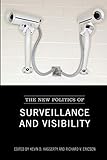The New Politics of Surveillance and Visibility / ed. by Richard Ericson, Kevin Haggerty.
Material type: TextSeries: Green College Thematic Lecture SeriesPublisher: Toronto : University of Toronto Press, [2006]Copyright date: ©2005Description: 1 online resource (400 p.)Content type:
TextSeries: Green College Thematic Lecture SeriesPublisher: Toronto : University of Toronto Press, [2006]Copyright date: ©2005Description: 1 online resource (400 p.)Content type: - 9780802048783
- 9781442681880
- 303.3/3 22
- online - DeGruyter
| Item type | Current library | Call number | URL | Status | Notes | Barcode | |
|---|---|---|---|---|---|---|---|
 eBook
eBook
|
Biblioteca "Angelicum" Pont. Univ. S.Tommaso d'Aquino Nuvola online | online - DeGruyter (Browse shelf(Opens below)) | Online access | Not for loan (Accesso limitato) | Accesso per gli utenti autorizzati / Access for authorized users | (dgr)9781442681880 |
restricted access online access with authorization star
http://purl.org/coar/access_right/c_16ec
Since the terrorist attacks of September 2001, surveillance has been put forward as the essential tool for the 'war on terror,' with new technologies and policies offering police and military operatives enhanced opportunities for monitoring suspect populations. The last few years have also seen the public's consumer tastes become increasingly codified, with 'data mines' of demographic information such as postal codes and purchasing records. Additionally, surveillance has become a form of entertainment, with 'reality' shows becoming the dominant genre on network and cable television.In The New Politics of Surveillance and Visibility, editors Kevin D. Haggerty and Richard V. Ericson bring together leading experts to analyse how society is organized through surveillance systems, technologies, and practices. They demonstrate how the new political uses of surveillance make visible that which was previously unknown, blur the boundaries between public and private, rewrite the norms of privacy, create new forms of inclusion and exclusion, and alter processes of democratic accountability. This collection challenges conventional wisdom and advances new theoretical approaches through a series of studies of surveillance in policing, the military, commercial enterprises, mass media, and health sciences.
Mode of access: Internet via World Wide Web.
In English.
Description based on online resource; title from PDF title page (publisher's Web site, viewed 01. Nov 2023)


